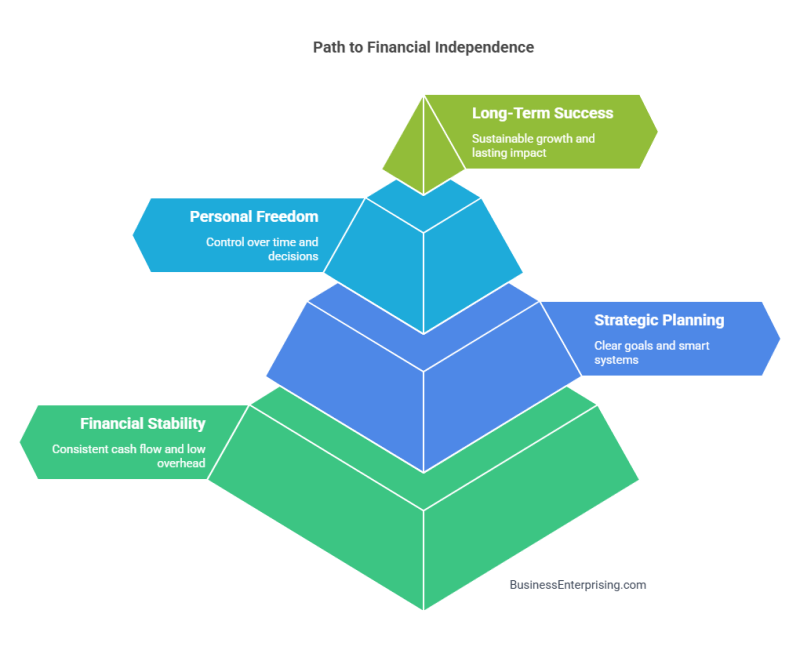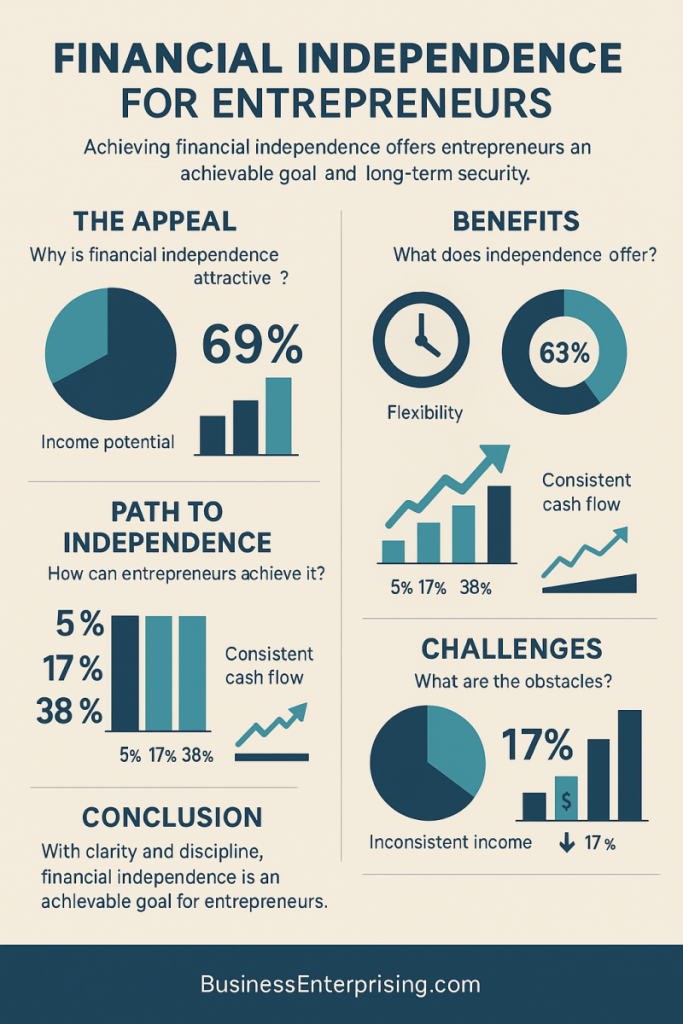 Financial independence for entrepreneurs is not just a personal goal. It is a practical strategy that supports long-term business success. When you no longer rely on outside income, you gain more freedom to make better choices. Additionally, you reduce the pressure that often leads to rushed decisions and wasted resources.
Financial independence for entrepreneurs is not just a personal goal. It is a practical strategy that supports long-term business success. When you no longer rely on outside income, you gain more freedom to make better choices. Additionally, you reduce the pressure that often leads to rushed decisions and wasted resources.
However, reaching that level of independence requires more than profit. You need discipline, planning, and smart systems that support consistent cash flow. Therefore, it helps to define what independence means for you. Some want full-time freedom. Others just want breathing room to make better choices.
You may already be on the path without realizing it. Small steps like saving, automation, or debt reduction all contribute. Additionally, building stable income streams creates options for growth, rest, or pivoting your model. These benefits often appear gradually but create lasting impact.
Financial independence also helps you weather tough seasons. Business slows, clients delay, or markets shift. However, if you’re not living check to check, you can ride it out and adjust. Therefore, independence acts as a buffer that protects both your business and well-being.
You don’t need to be rich to be financially independent. You just need clarity, control, and consistency. If you plan wisely, act early, and stay focused, your business can support the life you want to build.
The Appeal of Financial Independence
Financial independence holds strong appeal for many entrepreneurs. You may want more control over your time, income, and business decisions. The freedom to choose how and when to work drives many people to start a business. However, reaching this goal takes patience, planning, and consistent effort.
Additionally, financial independence for entrepreneurs means more than covering basic costs. You want to build stability, not just survive from month to month. Therefore, you need systems that bring in steady income without constant effort. This might include recurring revenue, automation, or passive income streams.
You may also value the freedom to make long-term choices. For example, you can invest in better tools, hire support, or take time off. These decisions are harder when money is tight. Therefore, reaching independence can reduce stress and improve your work-life balance.
However, you must still manage risk. Independence does not mean ignoring budgets or avoiding accountability. It means building something strong enough to stand on its own. Therefore, you should review your numbers regularly and test new ways to grow profit without extra overhead.
Many entrepreneurs work toward independence without a clear plan. You should take time to define what it means for you. Then build your business model to support that goal. If you keep your costs low, income steady, and goals clear, you’ll gain more freedom with each step.
Financial independence means different things to different people, but at its core, it represents the ability to support oneself without relying on a traditional job or employer. For entrepreneurs, this goal is often synonymous with the desire to create a business that generates sustainable income, provides financial security, and allows for greater control over one’s financial future.
Several factors make financial independence particularly appealing to entrepreneurs:
Control Over Income:
Traditional employment often comes with a fixed salary, with limited potential for significant income growth. In contrast, entrepreneurship offers the opportunity to directly influence one’s earnings through business growth and success. Entrepreneurs can set their prices, scale their operations, and innovate to increase profitability.
Flexibility and Freedom:
Financial independence provides the flexibility to make personal and professional choices without being tied to a job. Entrepreneurs can decide how, when, and where they work, which can lead to a better work-life balance and the ability to pursue other interests and passions.
Building Wealth:
Entrepreneurship can be a pathway to wealth creation. By building a successful business, entrepreneurs can generate significant financial returns, build valuable assets, and create a lasting legacy. This potential for wealth creation is a compelling motivator for many individuals.
Impact and Legacy:
Financial independence allows entrepreneurs to make a broader impact. With financial resources and freedom, they can invest in causes they care about, support their communities, and create a legacy that extends beyond their business.
Benefits of Financial Independence
Financial independence gives you more than just money. It gives you choices. You decide how to spend your time and energy. That flexibility helps you run your business with less stress. Additionally, it reduces the pressure to chase short-term results.
You can take breaks when needed without worrying about falling behind. This helps you stay focused and make better decisions. Therefore, your work becomes more intentional and less reactive. You gain more control over your schedule, which supports better health and stronger relationships.
Financial independence for entrepreneurs also means fewer compromises. You can turn down bad deals or difficult clients. Additionally, you can reinvest in growth instead of scrambling to pay bills. That freedom builds confidence and creates space for better planning.
You may also feel more creative. When basic needs are covered, you can explore new ideas without fear. Therefore, you can test new offers or enter new markets more easily. This flexibility can lead to fresh opportunities that wouldn’t be possible under financial strain.
However, independence does not mean doing nothing. You still need discipline and focus to maintain it. Track your progress often and adjust when needed. Build your systems to support consistency, not just income spikes.
If you stay lean, plan wisely, and avoid unnecessary debt, you move closer to real freedom. That’s the true value of building your business around independence.
Achieving financial independence through entrepreneurship comes with numerous benefits:
Security and Stability:
Financial independence provides a safety net that can protect against economic downturns, job loss, and other financial uncertainties. It ensures that entrepreneurs and their families have the resources they need to maintain their standard of living.
Empowerment:
Being financially independent empowers entrepreneurs to make decisions that align with their values and goals. It reduces reliance on external sources of income, fostering a sense of autonomy and control.
Opportunities for Growth:
With financial independence, entrepreneurs have the flexibility to reinvest in their businesses, explore new ventures, and take calculated risks. This ability to innovate and expand can lead to further financial growth and success.
Personal Fulfillment:
Achieving financial independence is often a deeply fulfilling experience. It represents the culmination of hard work, perseverance, and strategic thinking. For many entrepreneurs, it brings a sense of accomplishment and pride.
Challenges in Pursuing Financial Independence
Pursuing financial independence takes more than a good idea and hard work. You may face setbacks that slow your progress. Cash flow issues, rising costs, or missed goals can quickly change your plans. However, these challenges are common and can be managed with focus and flexibility.
One of the biggest hurdles is inconsistent income. Many entrepreneurs struggle to plan when revenue changes month to month. Therefore, building predictable income should be a priority. You may need to adjust your offer, pricing, or customer base to stabilize results.
Additionally, unexpected expenses can create delays. You might face repairs, late payments, or marketing costs that hit at the wrong time. Therefore, you should build a small reserve and protect your operating cash. That buffer gives you time to adjust rather than panic.
It can also be hard to balance short-term needs with long-term goals. You may want to save or invest, but urgent bills get in the way. However, even small wins count. You can start by setting aside a fixed percentage of income each month.
Time management creates another challenge. You often wear many hats and work long hours. Additionally, burnout can lead to poor decisions that hurt progress. Therefore, protecting your energy is part of the financial process.
Financial independence for entrepreneurs does not come easy. It requires consistency, discipline, and the ability to make trade-offs. However, each step forward brings more freedom and control. If you stay clear on your goals and adapt when needed, you’ll move closer to the life you want.
While the pursuit of financial independence is a significant motivator, it is not without its challenges:
Initial Financial Risk:
Starting a business often requires significant financial investment. Entrepreneurs must be prepared to invest their savings, secure loans, or seek investors. This initial financial risk can be daunting and requires careful planning and risk management.
Uncertain Income:
Unlike a steady paycheck from traditional employment, entrepreneurial income can be unpredictable, especially in the early stages. Entrepreneurs must be prepared for fluctuations in revenue and have strategies in place to manage cash flow.
Time and Effort:
Achieving financial independence through entrepreneurship requires dedication, hard work, and long hours. The path to success is often filled with obstacles, and entrepreneurs must be resilient and persistent.
Market Dynamics:
Entrepreneurs must navigate market dynamics, competition, and changing consumer preferences. Staying ahead in a competitive market requires continuous innovation, strategic planning, and adaptability.
Strategies for Achieving Financial Independence
Achieving financial independence takes more than just making money. You need to build habits that support long-term stability and smart growth. Start by tracking every expense. This helps you spot patterns and cut anything that doesn’t support your business.
Additionally, build a budget that reflects your actual goals. Keep your overhead low while you test what works. Therefore, every dollar you save becomes a tool for reinvestment. Focus on income sources that are steady and repeatable. Subscriptions, retainers, and digital products can provide more predictable revenue.
You should also create systems that work without you. Automation helps reduce time spent on tasks that don’t drive results. For example, you can use tools to manage email, invoices, or appointments. These steps may seem small. However, they allow you to scale without overextending yourself.
Building financial independence for entrepreneurs means having control over both income and expenses. Therefore, prioritize savings. Even small amounts add up over time. Set aside money for taxes, downtime, and reinvestment before spending on extras. This habit builds discipline and reduces stress.
Additionally, avoid comparing your progress to others. Your goals and timing are unique. Focus on what supports your life and business. Review your numbers regularly and adjust when needed. If something isn’t working, shift quickly without hesitation.
With the right systems, planning, and mindset, independence becomes achievable. The process takes time, but every smart decision moves you forward. Stay consistent, and you’ll create the freedom you’re working for.
Despite the challenges, there are several strategies that entrepreneurs can employ to achieve financial independence:
Develop a Solid Business Plan:
A well-structured business plan is crucial for success. It should outline the business model, target market, revenue streams, and financial projections. A clear plan provides a roadmap for achieving financial goals.
Diversify Income Streams:
Relying on a single source of income can be risky. Entrepreneurs should explore multiple revenue streams, such as offering different products or services, expanding into new markets, or creating passive income sources.
Focus on Profitability:
While growth is important, profitability should be a primary focus. Entrepreneurs should regularly review their financials, optimize costs, and ensure that their business is generating sustainable profits.
Invest in Education and Skills:
Continuous learning and skill development are essential for entrepreneurial success. Staying informed about industry trends, financial management, and business strategies can provide a competitive edge.
Build a Strong Network:
Networking with other entrepreneurs, mentors, and industry experts can provide valuable insights, support, and opportunities. A strong network can help entrepreneurs navigate challenges and accelerate their path to financial independence.
Conclusion
Financial independence gives you options that many business owners never reach. It allows you to decide how and when to grow. Additionally, it removes the stress of living month to month. When you reach that level, you gain more control over your time and energy.
However, reaching that point takes consistency. You must plan, test, and adapt without losing focus. Therefore, track your progress regularly and stay committed to your goals. Many small steps lead to big results when taken consistently over time.
You may face setbacks along the way. Costs can rise, income can drop, or your plans may change. However, these moments don’t have to slow you down. If you stay flexible and protect your margins, you can recover and adjust as needed.
Additionally, your mindset matters. You must view each decision through the lens of long-term value. Spending less and earning more is only part of the equation. Therefore, you should build habits that support growth, not just quick wins.
Financial independence for entrepreneurs isn’t just about wealth. It’s about stability, freedom, and the ability to make better decisions. If you stay focused on value, plan ahead, and build smart systems, you’ll get there. Each choice you make moves you closer or farther from your goals. Therefore, act with purpose. Keep your plans simple and your priorities clear. The path may be long, but progress comes from staying the course.


